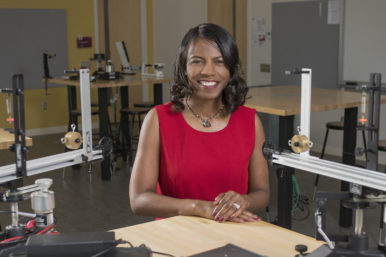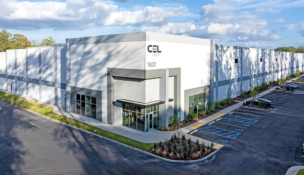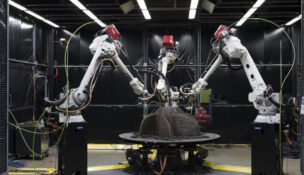Tech support
New ODU center focuses on maritime cybersecurity
Beth JoJack //April 30, 2020//
Cybersecurity may not be the first idea that springs to mind when thinking about the maritime industry, but it is an increasingly important field. And the new Coastal Virginia Center for Cyber Innovation (COVA CCI) at Old Dominion University is proof enough.
The center’s $2.5 million, two-year budget supports its mission to close the cybersecurity workforce gap and to spur innovation and the commercialization of cybersecurity research, with a particular focus on the maritime industry.
Launched in July 2019, the center is one of four regional cybersecurity nodes across the state led by the Commonwealth Cyber Initiative hub, which is based at the Virginia Tech Research Center in Arlington.
Established with $25 million in state funding, CCI’s goal is to leverage the brain power at Virginia’s higher education institutions, along with representatives from government and the private sector, to transform the commonwealth into a cybersecurity world leader.
The Virginia Research Investment Committee (VRIC), which manages the Virginia Research Investment Fund established by the General Assembly as part of the GO Virginia economic development initiative, certified the four regional nodes in June 2019 and allocated two years of funding to the nodes last December.
Researchers at the ODU center are particularly interested in examining new cybersecurity technology that could transform the maritime shipping industry, explains Brian Payne, the center’s director as well as ODU’s vice provost for academic affairs.
“We have one project right now where one of our researchers is working with the Port of Virginia and folks at Virginia Tech also to develop a 5G [wireless] test bed that would look at sensors on containers,” he says, “using sensors … to monitor how much [cargo] is in the containers and where the containers are going and how to do it in a way that is cost-efficient, as well as minimizing the environmental impact.”
Researchers will also consider how to protect sensors and containers from tampering. “We need to make sure they’re safe,” Payne adds.
Even amid the COVID-19 global pandemic, work on the project has been able to continue. “Researchers are able to work remotely,” he says. “From the beginning, our research connections were virtual in nature, and this will continue. Our reliance on cybertechnology went through the roof in the past week. The need for our efforts, as a result, only increased.”
The coastal center will use its $2.5 million in funding for product and business development, hiring research scientists, supporting research by graduate students and promoting learning opportunities for the region’s cybersecurity students. VRIC allocated the center an additional $500,000 to aid with construction costs for the Cyber Innovation Park, an ODU campus building that will include classrooms as well as research and office space. (ODU is providing the extra $1.5 million needed to construct the building.)
Although ODU serves as its coordinator, the center’s partners include William & Mary, Norfolk State University, Christopher Newport University, Regent University, ECPI and area community colleges. The wider CCI network includes more than 300 faculty members from 39 higher-education institutions — who are all encouraged to collaborate. “The willingness of folks from these different areas and institutions to work together has been pretty remarkable,” Payne says, and the leadership team has been communicating to make sure they maintain momentum during the pandemic.
With more work and study moving online during the pandemic, the demand for cybersecurity workers is only increasing, Payne adds. “I’d expect this demand to be even higher than it was.”
Debt-free education
During an age when many Americans are drowning in a sea of college debt, The Apprentice School in Newport News stands out for offering paid, tuition-free, four-to-eight-year apprenticeships, training students to become shipbuilders.
Operated by Huntington Ingalls Industries’ Newport News Shipbuilding, the school pays apprentices for both work and time spent in class.

“You have a job Day One, with benefits,” explains Latitia McCane, the school’s director of education.
Many students at The Apprentice School, which has a student body of around 850, already have a degree in another discipline. Others have taken college credits but have not graduated from college.
“When you talk to these populations of students, the majority of them do have college debt,” McCane says. “They do not want to continue to acquire college debt.”
The school offers training in 19 trades, including heating and air conditioning, pipefitting and rigging. The school also offers eight advanced programs, including the option of earning a degree in electrical or mechanical engineering from ODU — once again, tuition-free.
Like other educational institutions, The Apprentice School has made adjustments to protect students and staff against the coronavirus pandemic, including shifting to online classes for pre-advance and advance students. The second term of World Class Shipbuilding, which requires in-person training, was postponed, according to a spokesperson.
Not surprisingly, a lot of people are interested in being paid to learn valuable job skills without a tuition fee. The Apprentice School gets about 3,000 applicants for 250 openings each year.
Admissions staffers look for students who performed well in science and math classes and who came out of career and technical education (CTE) programs, according to McCane. “A lot of times that’s hard to get in the same package, but more of your high schools are doing a better job in ensuring that although those people are in CTE, they’re still getting the academics,” she says.
Since The Apprentice School opened in 1919, it has graduated 10,800 students. Like their predecessors, today’s graduates are likely to spend their careers building ships for the U.S. Navy and Coast Guard. But their skills are much more advanced than shipbuilders of past decades, encompassing 21st century innovations.
“We’ve gone to a more technological age, and The Apprentice School has had to evolve to be able to keep up with that,” McCane says. “Now students bring their own laptops to school, whereas a year or so ago, that was unheard of.”
r


















